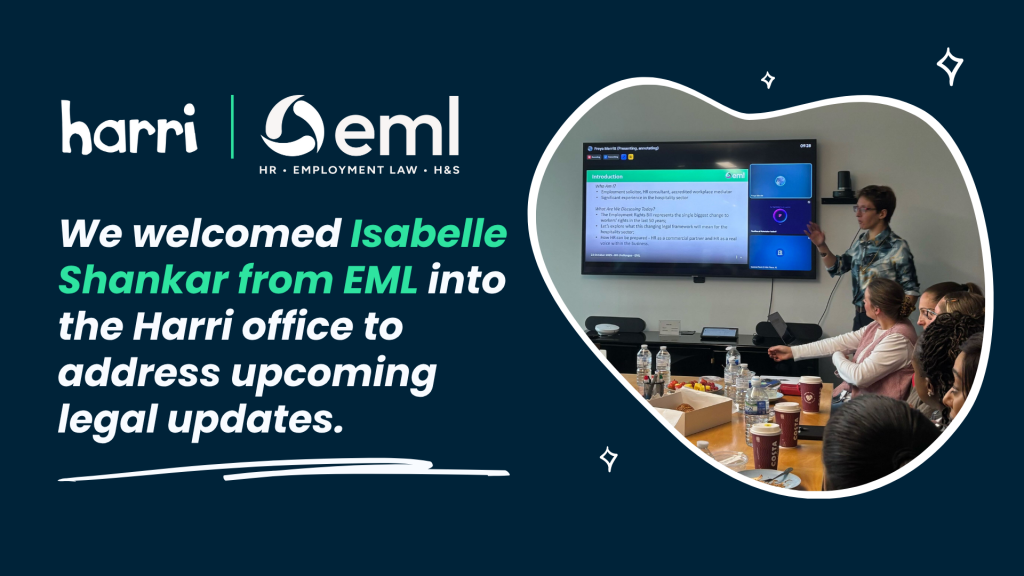Your Survival Guide: Taming the Employment Rights Bill

- By Harri Insider Team | October 23, 2025
The HR world is on the cusp of a major shake-up. If today’s Breakfast Roundtable on the Employment Rights Bill (ERB) taught us anything, it’s that burying your head in the sand just isn’t an option. Check out the slides from the session here.

The Wake-Up Call for Hospitality HR
Our expert, Isabelle, an employment law magistrate and HR consultant, was passionate and direct: the industry faces a perfect storm of cost pressures from rising National Minimum Wage to increased National Insurance contributions. All of this hits the hospitality sector hardest because, as Isabelle noted, it’s so intensely people-driven.
Adding to the complexity are workforce dynamics: high staff turnover, the prevalence of flexible contracts (hello, zero-hours!), and managing a distinct, younger, and with more awareness of a neurodivergent generation of workers. This cohort demands more than just wages; they crave culture, coaching, and a sense of purpose.
Big Changes You Can’t Wing
While some dates are a little way off (like Day One Unfair Dismissal rights, stated for 2027), the time to prepare is now. You can’t just ‘wing it’ anymore.
The Recruitment Imperative
With full unfair dismissal rights on the horizon, getting recruitment right becomes existential. As Candid’s team, Jessie and Beth, explained, tech solutions that match on skills and values are more critical than ever, shifting the game from high-volume applications to quality, pre-matched candidates. In the world of hiring, smart tech is the only way to genuinely stack the odds in your favour.
The Zero-Hours Contract Conundrum
Perhaps the most hotly debated topic was the “Guaranteed Hours” provision. The government is pushing back against the idea of employees having to request these hours instead, employers will have to offer a contract reflecting the hours an employee has worked in a reference period. As Isabelle explained, this could turn the process into an endless cycle of offering, refusing, and re-offering a logistical nightmare for HR and Ops.
- Impact on Agency Workers: This right will extend to agency workers, forcing end-users to offer guaranteed hours to regular temps. This blurs the line between a worker and an employee and may trigger hefty agency fees.
- A Scheduling Tightrope: The new rules will demand meticulous tracking of working hours, making spontaneous shift cancellations and last-minute cover a high-stakes guessing game.
Risk and Accountability
- Sexual Harassment: Employers will soon have a duty to take all reasonable steps to prevent sexual harassment, including from third parties, including customers. Failure could result in a 25% uplift on compensation awards. This requires rigorous risk assessment, effective training, and an unshakeable commitment to a strong workplace culture.
- Fire and Rehire: Stricter rules are coming next year, severely limiting your ability to change contracts without employee agreement. Variations like changes to pay or shift patterns will be much harder to enforce, essentially requiring a business to be on the brink of insolvency to justify the move.
Your Plan of Action: Tech is Your Shield
The overwhelming takeaway is that technology is no longer a ‘nice-to-have’, it’s your frontline defense against fines and complexity.
Isabelle’s advice for HR is clear: You need to step up and be a strategic partner, not just an administrative function. You need to speak the language of risk management and finance to your operators.
Here’s how technology, like Harri, will help you meet the coming demands and avoid compliance fines:
- Audit-Ready Scheduling: Technology that provides a full audit trail of every single schedule change is paramount. Harri’s system, for example, is designed to flag potential violations before a schedule is posted; think red and green lights on rota errors.
- Mitigating Guaranteed Hours: You need a system that can accurately track working hours across rolling periods, automating the offer of guaranteed hours and logging the employee’s response. This record is your proof of compliance.
- Day-One Readiness: Tech can help embed rigorous performance management and clear induction processes from an employee’s very first shift, creating the paper trail you’ll need to manage performance and conduct under the new day-one rights.
The Employments Right Bill is complex, and the regulations are still being ironed out, but the risk is real, and the changes will come one way or another. As Isabelle made clear, technology will be your only way to automate the monumental task of compliance and mitigate the financial fallout from the coming legislative changes.
Ready to turn compliance risk into operational efficiency?
See how Harri can help you prepare for the new Employments Right Bill and reduce your risk of fines.




















